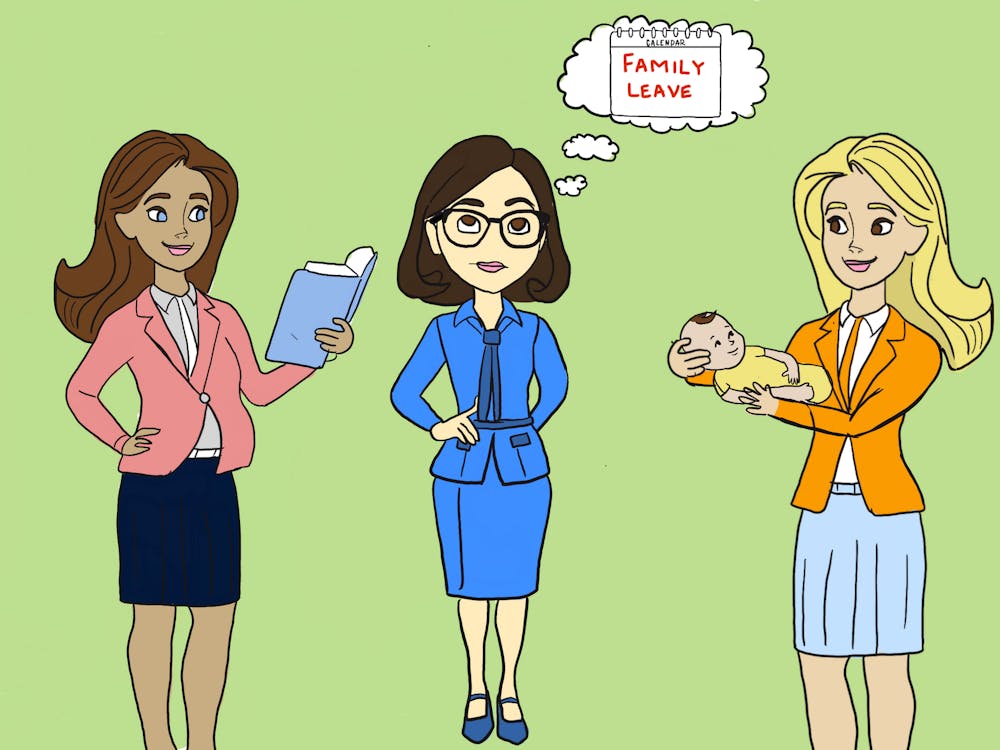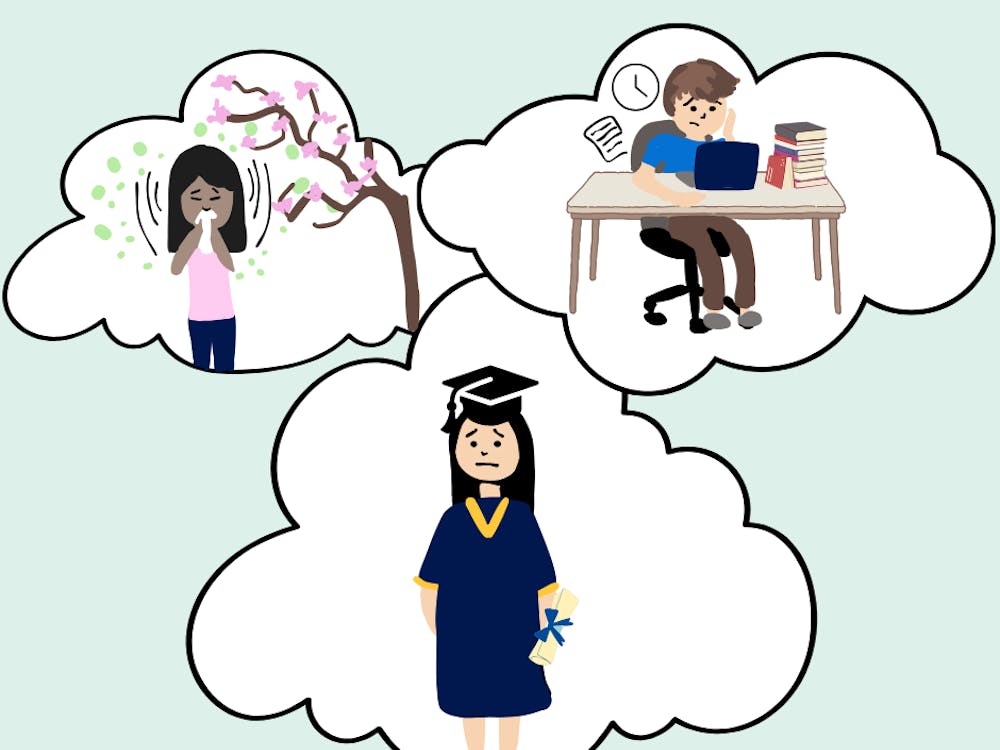Something seems amiss. At a school where 54 percent of the undergraduate population is female, why -- individual School Council elections aside -- did women comprise only 39 percent of candidates in the spring elections?
A closer look at the numbers reveals a deeper problem in certain sections of the ballot. In the most gender-disparate races, for example, 22 men sought positions as Honor Committee representatives while only 10 women did the same. The race for Student Council representatives had a similar ratio.
The only section of the ballot in which the number of women considerably exceeded the number of men were in the races to be officers of individual School Councils -- 28 women to 15 men. But even in these races, the numbers are not encouraging. If the School of Nursing -- in which 10 of 10 candidates were women and the entire school is over 90 percent women -- is excluded, the resulting 18-women-to-15-men ratio is far from compensating for women's absence in other fields.
So where do these disparities come from, and do gender-based leadership differences end after students are elected? According to high-profile women elected last year, this year's candidate pool was fairly representative of the norm, but the real differences between men and women leaders won't begin until after they assume their offices.
Among those selected last year was Meghan Sullivan, who was elected as a representative for the Honor Committee and then chosen as the seventh woman chair ever in the Honor Committee's 167-year history, the last of whom served in 1998. Sullivan said she feels like they "don't have a very diverse candidate pool this year at all -- at least not in the contested undergrad elections."
Angela Carrico was chosen as a representative for the University Judiciary Committee before being tapped as chair of the UJC. Although Carrico's appointment followed the selection of several years of women chairs, she said she felt the need to prove herself so people would realize she "wasn't some timid woman who just let people walk all over" her.
The same election placed Kat Shea in the position of Class of 2005 president, a position dominated by men since 2000. The position of president of the Arts & Sciences Council was filled by Catherine Neale, following the terms of several women. Neale, however, is no stranger to assuming frequently male-filled positions -- she was recently selected as the next student member of the Board of Visitors, a group in which 13 of the current 16 members are male.
"During the second-round interview ... it was a room full of men and Vice President [Patricia] Lampkin and myself, and at that time I became acutely aware of my gender," she said.
Although these women leaders said their gender didn't influence their decisions to run or their campaigning tactics, they noted obstacles in obtaining their positions -- such as overcoming gender stereotypes -- which men may not encounter. In her own campaign, Sullivan found that many voters assumed she had "this very strong anti-single sanction opinion" even though she campaigned in support of it.
"I really think that has something to do with gender," she said, mentioning that people still make gender-based assumptions about her positions. "[I think it's] just the idea of women being more caring and nurturing and wanting to have a community that's forgiving ... rather than having a strong traditional view about honor."
Once in office they noticed at least partial exclusion from the networking available to their male peers.
"We get fewer social invitations," Sullivan said. "Informal networking is much, much harder this year than I think it was for other people who held my job in the past."
Shea, who is in an ideal position to notice gender disparities in social invitations because she dated last year's Fourth Year Class president during his term, agreed.
"I think it's very subtle, and I don't think people are doing it necessarily because they don't like me or anything like that," she said. "I just really think it is a gender issue. I don't even know if they're aware of it."
The subtle nature of their exclusion made it hard to identify immediately.
"It's just sort of an omission," Sullivan continued, adding that it took her about two months in office "to figure out what wasn't happening."
Since much of the work involved in top leadership positions is done with networking, according to Sullivan, obstacles to networking can pose real challenges and make leaders less effective.
Sullivan and Shea realized that their networking difficulties were probably due to their gender after speaking with each other and other woman leaders, including former Student Council President Daisy Lundy.
"I thought it was me for a while because I am just sort of a different Honor chair," Sullivan said, mentioning her academic focus and non-participation in the Greek community. "But I just remember last October ... bringing up our individual complaints about how things were going and realizing that it was happening. And I really do think it happens to a lot of women who get into really high leadership positions."
In addition to meeting with each other to compare experiences, women leaders seek each other out for support and advice, also often meeting with female administrators who can relate to their situations. All four women agreed the "good old boys" social network still exists at the University, but women also may be supported by female alumnae in what Neale called the "good old gals alumnae network," which increasingly rivals that of men. Shea said a women's network, while temporarily necessary, is not the goal.
"It's kind of annoying that a network is going to exist no matter what, but it would be better to have just one network," she said.
Although their relationships with alumni may be weaker than those of their male counterparts, women leaders said that within their organizations they may serve important roles that men are less likely to fill.
"I think that women traditionally are more compassionate toward people and more understanding," Carrico said. "So I think a lot of times I definitely try to see both sides of something, whereas -- not to stereotype men -- but sometimes they will just make a decision without really looking at everything."
Also, high-profile women leaders may positively impact younger women at the University.
"I think women are universally more approachable," Neale said, mentioning that women tend to be "more willing to listen to everybody and less headstrong" than men.
Stephanie Goodell, the assistant director of student involvement, cautioned students against placing too much emphasis on gender-based generalizations of leadership styles. But Goodell, who has taught several classes about leadership at the University and is involved with international women's leadership programs and conferences, also pointed to studies which have shown that women are "more collaborative leaders" to suggest there may be some truth to certain perceptions about gender differences.
She said studies also have shown that while men's confidence levels tend to rise during college, women's fall, possibly contributing to women's decisions not to run for high-profile positions. Furthermore, Goodell said studies suggest women leaders may gravitate toward other types of organizations, specifically Madison House and other service organizations where women dominate both the leadership and membership. Women also may choose smaller or more narrowly-focused organizations where "it might be easier to make an impact," and serve as leaders without official positions.
Although many causes probably contributed to the relative absence of women candidates in this year's elections, Goodell postulated that women may be discouraged by patriarchal organizations which "are based on a very traditional organization chart which is not a collaborative model" because hierarchical organizations may be "less inclusive or less comfortable for women."
Some women may prefer appointed positions, according to Shea, who has helped choose Class Council members for the last two years.
"Both years the ratio of women applying to the men who apply is unbelievable -- tons more women apply," she said.
Additionally, Goodell said women leaders may be more critical of themselves than their male peers, an observation supported by Shea and Sullivan.
"I feel like I need to prove myself more -- I definitely feel a need to legitimate why I'm here," Shea said.
Sullivan shared Shea's perceptions.
"I think it's harder to accept praise," she said. "I'm much more skeptical of how well I'm doing."
One effort the University makes to help women overcome obstacles to leadership is the Women's Leadership Program. Advised by Goodell, the program focuses on developing the leadership potential of first and second-year women through "reflection, self-awareness, discovering your passion, identifying those barriers to women's leadership and figuring out what tools one needs to be successful," Goodell said.
Another factor involved in encouraging women to run in competitive races is mentoring. All four women mentioned fourth-year women leaders who had served as mentors or role models for them during their first and second years at the University. Although most of their student mentors have been female, Shea advised that "women shouldn't discount men as mentors at all."
They advised young leaders of both genders to seek out older students and faculty but also suggested women may benefit more from female mentors at times because they may have had similar experiences.
"I think our relationships became stronger because we're women," Neale said of her female mentors. "They make a world of difference and really allow you to explore the issue of women and female leaders in ways I couldn't do on my own."
Now that they are established as leaders in their own right, the women said they enjoy mentoring younger students.
"If we see first years who we think are rock stars, we want to help them," Shea said.
Most of all, the women urged younger women not to feel discouraged or uncompetitive because of their gender.
"Don't ever let your gender stand in the way of any of your dreams," Neale said. "You can do anything a man can do, and usually you can do it a lot better"






